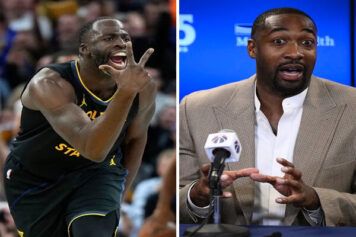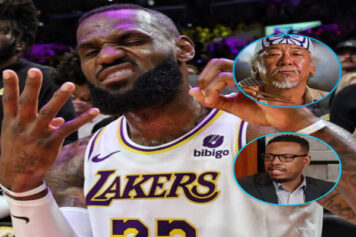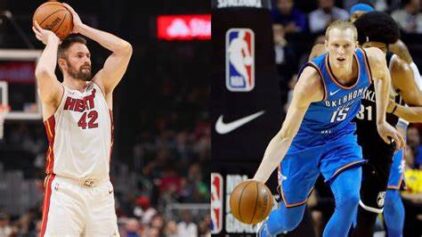Pay attention to the promos and social media hype leading up to the 2016 NBA Finals.
Itll sound something like this: LeBron James and the Cleveland Cavaliers take on Stephen Curry and the Golden State Warriors.
Now do your best to track down some promo material from, say, the 1989 NBA Finals. Better yet, ask your Dad, your Mom, your older brother or sister or any experienced basketball fan who remembers that time.
Itll sound something like this: The Lakers Angeles Lakers, led by Magic Johnson, take on the Detroit Pistons and Isiah Thomas.
They sound similar. But theyre not the same.
And its the difference between the two that says so much about what basketball has become and where it may be headed.
The 2016 NBA Finals is rich with team-centric storylines. The Warriors, having won a league-record 73 games in the regular season, need four more wins to stake a legit claim the greatest basketball team of all time. The Cavaliers represent the city of Clevelands best hope at winning a major pro sports championship for the first time since 1964. The Warriors will be defending the championship they won last year against the same team they beat for that crown, while the Cavaliers will be looking to avenge last years frustrating loss against the team that dashed their title hopes.
And yet its awfully easy to get the impression that this series isnt about any of that.
Mainstream and social media has successfully sold this series as not Warriors vs. Cavaliers, but instead as Stephen Curry vs. LeBron James.
This series is about LeBron trying to win his third championship ring and third Finals MVP, tying him with Larry Bird in the first category and pushing him past Kobe Bryant in the second.
This is about Curry trying to win his second straight championship ring and his first Finals MVP, adding some credence to the increasingly popular opinion that he may be one of the greatest players of all time.
This is about LeBron trying to avoid a fifth career Finals series loss in seven trips. This is about Curry trying to avoid losing a championship hes been expected to retain pretty much all season long.
Pay attention to how much those last few paragraphs mentioned two individuals. Pay attention to how little they mentioned their teams.
(Photo Credit: Getty Images)
From the birth of a basketball nation up to now, somewhere along the way, we the fans, the media, society at large stopped viewing this sport through the lens of a team with its star, and started viewing it as a star with their help or their supporting cast.
Warriors versus Cavaliers in 2016 is not advertised as one great team versus another. It is advertised as LeBron James and the guys helping him (e.g. Kyrie Irving and Kevin Love) versus Stephen Curry and his supporting cast (e.g. Klay Thompson and Draymond Green).
Check out any NBA team photo past or present. Usually youll see two rows of athletes, flanked by some coaches and trainers and maybe a ball boy or two. The guy sitting in the center of the front row holding the basketball is probably the head coach. Or maybe its the starting point guard. Or maybe its just the shortest guy on the team. Either way, it is a team. The image doesnt lean one way or another under the weight of one individual in it.
The best player on the team? He could be anywhere in the photo, because his placement depends more on his height and less on his hype.
But if art truly reflected life, an NBA team photo in 2016 would feature the best player or the most marketable player (theyre not always the same person) front and center with the ball, cast under a brighter spotlight than the rest, with his teammates a step or two behind him.
If that description conjures images of a pop music star and their backup singers, that is because basketball long ago crossed over into being part of the entertainment industry.
Over its 70-year history, the NBA has not lacked for superstar talent. It has rarely lacked for celebrity personalities.
But we are now truly witnessing a league whose narrative is for better or worse entirely driven by celebrity superstar athletes. And it seems weve all bought into the myth that the fortunes of an entire team fall at the feet of the one man on the roster who fits that bill.
And there is one man on whom we could place a lot of blame for that.
Maybe its my fault, Michael Jordan once said in a Nike commercial. Maybe I destroyed the game.
I wouldnt go that far, Mike.
But this culture of superstar worship in basketball is kinda on you.
Before Jordan went 6-0 in the NBA Finals, was that kind of stat even important? Whose individual Finals records did we know by heart and use as a primary method of praise or criticism of a player?
If youre reading this youre probably a basketball fan, and if youre a basketball fan you probably know that Bill Russell won 11 NBA championships. Now without looking it up, do you know how many times Russell lost in the Finals?
The NBA history books burned into our brains that the Celtics used to dominate the Lakers. But if Jerry Wests 1-8 Finals record was as commonly associated with him as LeBron James 2-4 Finals record is associated with him, would West still be known as Mr. Clutch?
Would he still be chosen as The Logo?
Before Jordan complemented that unblemished Finals record with six Finals MVP trophies, it wasnt seen as a failure for a teams marquee name to not win an award that represented just a handful of games that were the punctuation mark to an entire season of brilliance.
We dont hear Magic Johnson being criticized for only winning three Finals MVPs in his five championships.
We do hear Stephen Curry being criticized for not winning Finals MVP in his championship season as if it wasnt good enough that Curry won the regular-season MVP and that Golden State and Finals MVP Andre Iguodala wouldnt have even been in that series without Curry.
Before Jordan seemed to take (and make) every clutch shot nostalgia has effectively erased most of the misses how many superstars were criticized for not doing it all, so long as their team won in the end?
When John Havlicek famously stole the ball in the 65 Eastern Conference finals, he clinched a win for the Celtics. History has not cast Russell as the only guy whose hide was saved with that play.
But what is the narrative of the 2013 NBA Finals? That Ray Allens famous three-pointer saved LeBron James from another Finals loss. Not the Heat, not Dwyane Wade, not Chris Bosh. Just LeBron.
Think of some of historys great pro basketball teams: The aforementioned Showtime Lakers and Bad Boy Pistons, the dominant 1960s Celtics, the 1970s Knicks who turned the Garden into Eden, the Little-Mo-Big-Mo-The-Doctor-Andrew-Toney-Iavaroni-No-Baloney 76ers.
Think about how those units wouldve been (and sometimes are retroactively) described in our current media and public climate. It would be Magic and his star-studded help; Isiah carrying some blue-collar scrappers; Russells loaded Celtics boringly running through allegedly weak competition; Walt Frazier and a solid supporting cast, and a ring-chasing Moses Malone helping an aging Doctor J finally get one that he needed to avoid going 0-4 in the Finals.
As Michael Jordan made his rise from a star to a superstar to THE superstar, he changed not only how the game was played, but how the game was portrayed.
Michael Jordan and the Jordanaires is what some called it then. Help and supporting cast is what they call it now.
This week, the two best teams in the NBA will begin playing each other for the right to be called champion.
These teams have at times looked unstoppable on offense and unbreakable on defense.
These teams each have an entertaining mix of players and personalities.
These teams and the cities they represent have history, pride and legacies on the line.
And this series has two superstars who because they play different positions and most likely wont be guarding each other have been booked for a 1-on-1 showdown that should have only slightly more contact than a MLB pitchers duel.
Its too bad that it seems all anyone cares about is that last part.




